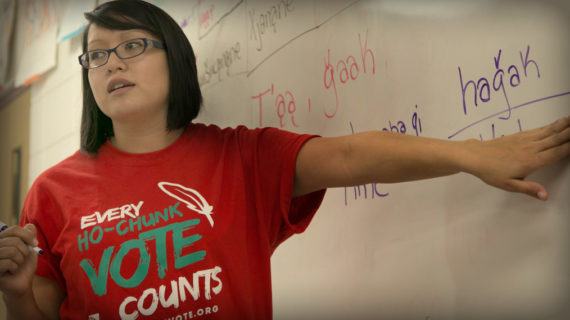Frederica Freyberg:
In education, a critical shortage of school therapists is plaguing districts across the country as mental health challenges for students surge. Seeing the need, educators and students in Wisconsin are finding ways to bridge the gap. Steven Potter has more.
Andy Farley:
I think every school principal would love to have more mental health professionals.
Steven Potter:
Despite having a handful of counselors, a school psychologist and a social worker on staff, Andy Farley, principal of Brookfield East High School, says they still have trouble meeting the mental health needs of their 1,400 students.
Andy Farley:
It’s never going to be enough.
Steven Potter:
Farley knows firsthand how devastating student mental health problems can become. A few years back, a number of students at Brookfield East High School died from suicide.
Andy Farley:
Incredibly difficult. Incredibly difficult at our school level, incredibly difficult at our community level. We all knew we had to do something.
Steven Potter:
They created a local chapter of the national, student-led mental health support network called the Hope Squad.
Student:
Does anyone want to share out about some of the positives?
Steven Potter:
On a weekly basis, the school’s 60 student members discuss new strategies to help their classmates stay mentally healthy, from the importance of getting enough sleep and social/emotional learning techniques to recognizing suicide warning signs. Brookfield East sophomore Ledra Ashenbrenner is a Hope Squad member.
Ledra Ashenbrenner:
From a student standpoint, we are the eyes and ears of the school. We bridge the gap between students and counselors and teachers because research has shown that students are more likely to go to their peers if they’re having, like, an issue that they need help with.
Katie Eklund:
20% of kids have some type of behavioral or social/emotional concern.
Steven Potter:
Katie Eklund is a professor of school psychology at UW-Madison.
Katie Eklund:
But we know out of that group, only 20% of those kids actually receive that support.
Steven Potter:
Eklund works to find solutions to the increasing rates of young children suffering from anxiety and depression, including those harming themselves or considering suicide.
Katie Eklund:
Unmet mental health concerns we see often by the time kids get to high school. We see kids not coming to school. We see lower grades. We see higher incidents in the juvenile justice system and just lower, poor psychosocial outcomes throughout life.
Steven Potter:
Eklund says that children aren’t getting the help they need because of a shortage of mental health professionals, such as therapists, counselors and school psychologists. According to the National Center for Education Statistics, 70% of public schools say more students are seeking mental health services but 87% of those schools say they can’t provide such services to all of the students in need. Eklund and her colleagues, however, have a plan and new resources to address this shortage with a $10 million grant from the U.S. Department of Education.
Katie Eklund:
It’s designed to increase the pipeline of school psychologists, school social workers and school counselors who are working in K-12 schools around the country.
Steven Potter:
She says the need speaks for itself.
Katie Eklund:
In 2018, we had 60 to 70 unfilled positions across the state of school psychologists. We anticipate that school social workers and counselors are experiencing similar shortages, both here in the state and across the country and that those shortages have only increased over the last five years.
Steven Potter:
While everyone from school administrators to the students themselves agree that more mental health professionals are needed in schools, they would still need to be paid, and that’s where the state legislature could come in. Democratic State Representative Robyn Vining has introduced a package of bills aimed at increasing funding for K-12 mental health services. She says we’re well past the time for action.
Robyn Vining:
We know there’s a mental healthcare crisis. We know that. And so we cannot look away. I don’t believe that we can move forward right now without acting on mental healthcare.
Steven Potter:
One of Representative Vining’s bills would increase spending on mental healthcare services in the state’s school system by $100 million per year.
Robyn Vining:
We’re talking about children who are experiencing anxiety, depression, suicidality, and we’re trying to get professionals to be available to work with them, to help them survive this very difficult stage of life.
Steven Potter:
And so, at the local, state and national level, Wisconsin is working to respond to the growing mental health needs of its youngest populations. Reporting for “Here & Now” from Brookfield, I’m Steven Potter.
Frederica Freyberg:
If you or someone you know needs mental health resources, dial 988 for the Wisconsin Suicide and Crisis Lifeline. For more on this and other issues facing Wisconsin, visit our website at PBSwisconsin.org and then click on the news tab.
Search Episodes
Related Stories from PBS Wisconsin's Blog

Donate to sign up. Activate and sign in to Passport. It's that easy to help PBS Wisconsin serve your community through media that educates, inspires, and entertains.
Make your membership gift today
Only for new users: Activate Passport using your code or email address
Already a member?
Look up my account
Need some help? Go to FAQ or visit PBS Passport Help
Need help accessing PBS Wisconsin anywhere?

Online Access | Platform & Device Access | Cable or Satellite Access | Over-The-Air Access
Visit Access Guide
Need help accessing PBS Wisconsin anywhere?

Visit Our
Live TV Access Guide
Online AccessPlatform & Device Access
Cable or Satellite Access
Over-The-Air Access
Visit Access Guide
 Passport
Passport
















Follow Us